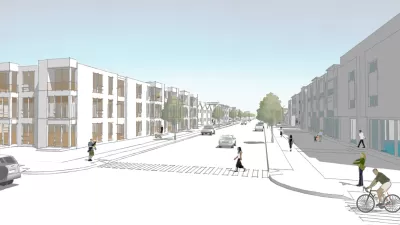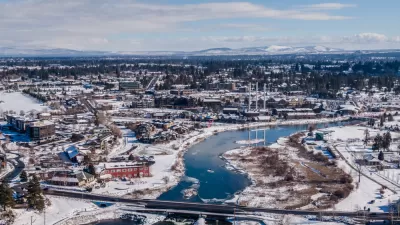The resistance to state-mandated zoning reforms, already well underway in Oregon, is now starting to whiplash through California as well.

Liam Dillon reports for the Los Angeles Times on the methods California cities are using to resist the mandates of Senate Bill 9, a statewide upzoning bill approved earlier this year.
According to Dillon, "Cities across the state, from Los Altos Hills and Cupertino in the Bay Area to Pasadena and Redondo Beach in Los Angeles County, are considering measures that would blunt the effects of the new law."
"Among other restrictions, local plans are aiming to limit the size and height of new development, mandate parking spots and require that such housing be rented only to those making moderate or low incomes," adds Dillon.
When it passed SB 9, California followed in the footsteps of Oregon, which approved House Bill 2001 in 2019 to similarly require Oregon cities to allow new density in neighborhoods exclusively zoned for single-family, detached housing. The city of Portland, Oregon experimented with their own way to counteract the state-mandated upzoning, by creating new criteria for declaring Portland neighborhoods as Historic Districts with the National Register of Historic Places. That effort, dubbed the Historic Resources Code Project is scheduled to appear before the Portland City Council on December 15.
A lot more detail on the methods specific California cities are using to repeat state-mandated zoning reforms are available in Dillon's Los Angeles Times coverage, linked below.
FULL STORY: Some California cities try to blunt new duplex law with restrictions on new developments

Alabama: Trump Terminates Settlements for Black Communities Harmed By Raw Sewage
Trump deemed the landmark civil rights agreement “illegal DEI and environmental justice policy.”

Planetizen Federal Action Tracker
A weekly monitor of how Trump’s orders and actions are impacting planners and planning in America.

The 120 Year Old Tiny Home Villages That Sheltered San Francisco’s Earthquake Refugees
More than a century ago, San Francisco mobilized to house thousands of residents displaced by the 1906 earthquake. Could their strategy offer a model for the present?

LA’s Tree Emergency Goes Beyond Vandalism
After a vandal destroyed dozens of downtown LA trees, Mayor Karen Bass vowed to replace them. Days later, she slashed the city’s tree budget.

Sacramento Leads Nation With Bus-Mounted Bike Lane Enforcement Cameras
The city is the first to use its bus-mounted traffic enforcement system to cite drivers who park or drive in bike lanes.

Seattle Voters Approve Social Housing Referendum
Voters approved a corporate tax to fund the city’s housing authority despite an opposition campaign funded by Amazon and Microsoft.
Urban Design for Planners 1: Software Tools
This six-course series explores essential urban design concepts using open source software and equips planners with the tools they need to participate fully in the urban design process.
Planning for Universal Design
Learn the tools for implementing Universal Design in planning regulations.
Ada County Highway District
Clanton & Associates, Inc.
Jessamine County Fiscal Court
Institute for Housing and Urban Development Studies (IHS)
City of Grandview
Harvard GSD Executive Education
Toledo-Lucas County Plan Commissions
Salt Lake City
NYU Wagner Graduate School of Public Service





























